How to Survive Your Thanksgiving Dinner - With New, Bonus Material
For those who might have missed it the first time, my ideas for how to avoid Armageddon breaking out at your table - while refocusing attention on gratitude.
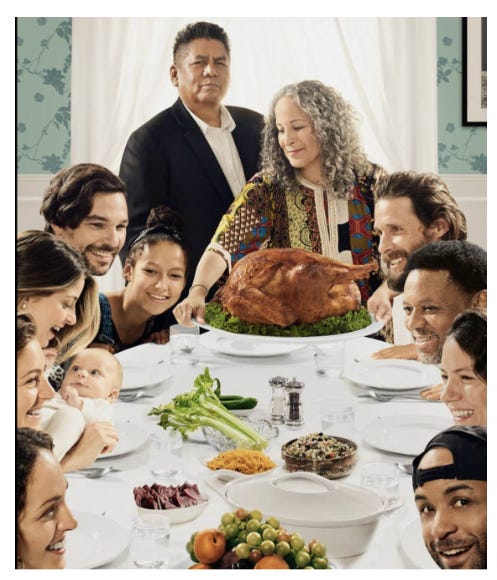
For those who might have missed it the first time around, below are my suggestions on how to avoid Armageddon breaking out at your table.
But before that, another idea to share, with some meaningful quotes from Jewish and non-Jewish sources:
And here again are my Ten Suggestions for avoiding Armageddon - plus one.
1) Stay away from all controversial subjects.
These days that includes even the weather, which has become a hot topic, both figuratively and literally. So if you avoid controversial topics like politics, religion, family, the weather and Aunt Sadie’s dry-as-the-Sahara sponge cake, that pretty much leaves us with meditating, chewing, whistling and various barnyard noises.
2) Stay away from any toxic words
In other words, anything that has been said on cable news over the past 24 months. Abraham Joshua Heschel wrote:
One of the results of the rapid depersonalization of our age is a crisis of speech, profanation of language.... Language has been reduced to labels, talk has become double-talk. We are in the process of losing faith in the reality of words.
3) Actually, silence is a good thing.
A few moments of silence couldn’t hurt. Abraham Joshua Heschel again: “Just to be is a blessing. Just to live is holy.” So for a few moments, contemplate what it means to be a blessing. Don’t say anything, and ponder what it means to just be.
4) Use that moment of silence to cultivate mindfulness.
And use this guide to bring a greater sense of mindfulness to all your Thanksgiving related activities. When you are food shopping, allow the food to call out to you. Turn off the radio while driving and be aware of your posture and your breathing. Notice the foliage and the changes in landscape, how as you climb in elevation, fall slowly slips into winter. Wherever you are, whatever you are doing, take deep breaths!
5) Don’t label the relatives.
Uncle Joe shouldn’t be pegged as “Socialist Uncle Joe who voted for Jill Stein,” or “Uncle Archie, the lovable bigot.” Joe is just Joe and Archie is just Archie. And of course do not label people by their faith tradition, ethnicity, gender or anything else. Let’s, for once, just be people. As Heschel wrote in No Religion is an Island (see p. 4 of this pdf of the full essay):
On what basis do we people of different religious commitments meet one another? First and foremost we meet as human beings who have so much in common: a heart, a face, a voice, the presence of a soul, fears, hope, the ability to trust, a capacity for compassion and understanding, the kinship of being human. My first task in every encounter is to comprehend the personhood of the human being I face, to sense the kinship of being human, solidarity of being.
6) Think of what everyone around the table has in common
Not how they differ. Somewhere in between the soup and the salad, slip into the conversation that you’ve recently had your DNA examined and it turns out the family is .1 percent Native American. That should get you clear through to the pumpkin pie. Remember to record for posterity the reaction of your Uncle Archie to that news.
7) When you do speak, speak from your heart.
The Hebrew word for family, Mishpacha, is phonetically connected to the word “to pour” (though the spelling is slightly different). Originally the reference was to blood, and family blood runs deep, but this is a time not to shed blood, heaven forbid, but to strategically spill your guts. Try to aim for a deeper conversation than last year’s discussion on all things Kardashian. Remember that everyone is fearful these days - for all kinds of reasons. We are all looking for support and genuine caring.
8) Focus on the food (except for Aunt Sadie’s sponge cake).
Noshing is sacred. There are some nice stories about food, like this heartwarming tale about the twelve hallot, one of my personal favorites. Take a look at a discussion packet I created, “Developing an Attitude of Gratitude.” Or download Hazon’s “Food for Thought” supplement and use some of its excellent material at your table. You will thank me.
9) Listen to Defying Gravity from the new Wicked movie.
And say nothing, in English, Ozian or any language, that would insultify your neighbor. Or if you are more into Hamilton-Meets-Fiddler, play this mash up of the Schuyler sisters as Tevye’s daughters. If things start to get tense at the table, just increase the volume. Much better than escaping to the football ritual of Lions (no Tigers) v. Bears (Oh My) in the other room.
10) And of course, count your blessings by actually reciting blessings.
Here are some prayers from different faiths. And here are some more. From Jewish standpoint, I’d go with ha-Motzi over bread to start the meal (no need for a prayer over wine) and Birkat Hamazon (Grace after meals) to end it. Here’s a short form for the Grace, and here’s the whole thing. Read about the 100 blessings Jews traditionally recite each day. Back in 1993 I asked my confirmation class to create their own list - here it is.
Or, best of all, just look around the table at all the people who, despite themselves sometimes, have loved you through the course of your life. Before the layoffs, the dementia, the Jewish Guilt, adolescence, Covid separation or that one horrible, un-take-back-able thing that was said, these are the people who made you who you are - at least before the years of therapy. Look around and realize how lucky you are to be alive right now. These are interesting times that have chosen us. Love ‘em or hate ‘em, we are here. To echo Eliza in Hamilton, “The fact that we’re alive is a miracle - just stay alive, that would be enough.”
Abraham Joshua Heschel begs to differ with Eliza, opening a dialogue that we might choose to pursue. He wrote the following in his 1969 essay, On Prayer:
Just to be is a blessing. Just to live is holy. And yet being alive is no answer to the problems of living. To be or not to be is not the question. The vital question is: how to be and how not to be? The tendency to forget this vital question is the tragic disease of contemporary man, a disease that may prove fatal, that may end in disaster. To pray is to recollect passionately the perpetual urgency of this vital question.
Yes, with apologies to the Schuylers, to stay alive would not be enough. It’s not just about survival alone. It’s about living an exalted life, a holy life, a moral life, a good life. Now more than ever, we are thankful for the ability that each of us possesses to nudge the world ever so slightly in that direction. And we are thankful for the people who will join us on that quest.
And I am thankful for all of you.
NOW, HERE’S ONE MORE SUGGESTION - ACTUALLY, FOUR-IN-ONE
The Four Freedoms
It's at times like these when I look back for moments of inspirational oratory, like FDR's 1941 "Four Freedoms" speech, as a reminder of what America is meant to symbolize, for ourselves and for the world.
As America stood on the brink of entering the war, these freedoms - the freedom of speech, the freedom of worship, the freedom from want, and the freedom from fear - symbolized America's war aims and gave hope in the following years to a war-wearied people because they knew they were fighting for freedom.
Here are some passages that I find most compelling today, even as the situation is so different. As we are both stunned and galvanized by the unfathomable sacrifices made by so many to preserve our democracy (and how capriciously those sacrifices are being treated right now), consider reading these words at your Thanksgiving table:
I suppose that every realist knows that the democratic way of life is at this moment being directly assailed in every part of the world-assailed either by arms, or by secret spreading of poisonous propaganda by those who seek to destroy unity and promote discord in nations that are still at peace.
...Let us say to the democracies: "We Americans are vitally concerned in your defense of freedom. We are putting forth our energies, our resources and our organizing powers to give you the strength to regain and maintain a free world. We shall send you, in ever-increasing numbers, ships, planes, tanks, guns. This is our purpose and our pledge.
In fulfillment of this purpose we will not be intimidated by the threats of dictators...
For there is nothing mysterious about the foundations of a healthy and strong democracy. The basic things expected by our people of their political and economic systems are simple. They are:
- Equality of opportunity for youth and for others.
- Jobs for those who can work.
- Security for those who need it.
- The ending of special privilege for the few.
- The preservation of civil liberties for all.
- The enjoyment . . . the enjoyment of the fruits of scientific progress in a wider and constantly rising standard of living.
These are the simple, the basic things that must never be lost sight of in the turmoil and unbelievable complexity of our modern world. The inner and abiding strength of our economic and political systems is dependent upon the degree to which they fulfill these expectations.
In the future days, which we seek to make secure, we look forward to a world founded upon four essential human freedoms.
The first is freedom of speech and expression-everywhere in the world.
The second is freedom of every person to worship God in his own way-everywhere in the world.
The third is freedom from want-which, translated into world terms, means economic understandings which will secure to every nation a healthy peacetime life for its inhabitants-everywhere in the world.
The fourth is freedom from fear-which, translated into world terms, means a world-wide reduction of armaments to such a point and in such a thorough fashion that no nation will be in a position to commit an act of physical aggression against any neighbor-anywhere in the world.
That is no vision of a distant millennium. It is a definite basis for a kind of world attainable in our own time and generation. That kind of world is the very antithesis of the so-called new order of tyranny which the dictators seek to create with the crash of a bomb.
To that new order we oppose the greater conception-the moral order. A good society is able to face schemes of world domination and foreign revolutions alike without fear.
And below is an updated version of the famous Norman Rockwell paintings, applying the Four Freedoms to today's more diverse and inclusive America.
Can these two visions of the Four Freedoms somehow be reconciled? How could they not? It’s not so simple as saying one is Red America and one represents Blue America. Look closely at the two sets of paintings and see what they have in common: the hands at prayer, the sick child in bed, the concern on parents’ faces, the civic responsibility on the face of the person exercising freedom of speech. The turkey. The hungry, smiling faces. The gratitude. As Heschel writes, “… a heart, a face, a voice, the presence of a soul, fears, hope, the ability to trust, a capacity for compassion and understanding, the kinship of being human.”
In that sense, the two sets of paintings are exactly the same!
And we know that. We absolutely know that. And the proof that we know that is that we experience it every day - or at least every Thanksgiving - when we sit down to eat and to give thanks.
Happy Thanksgiving!
Rabbi Joshua Hammerman

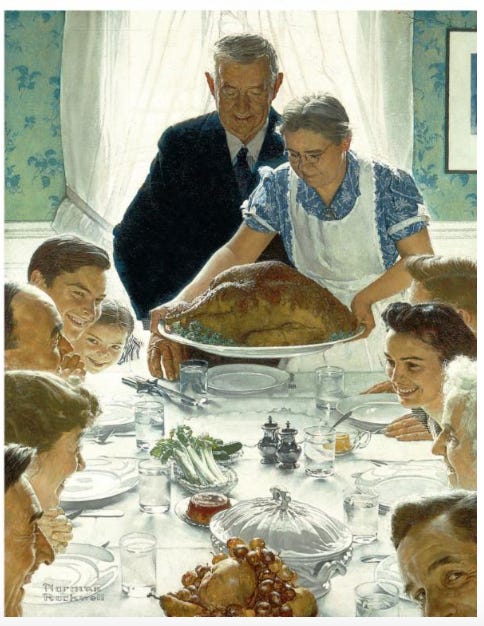
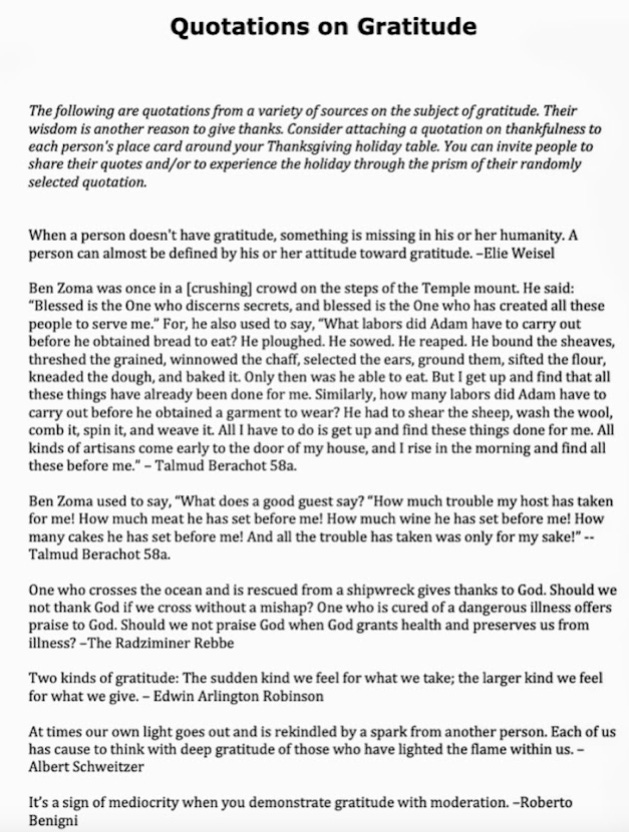
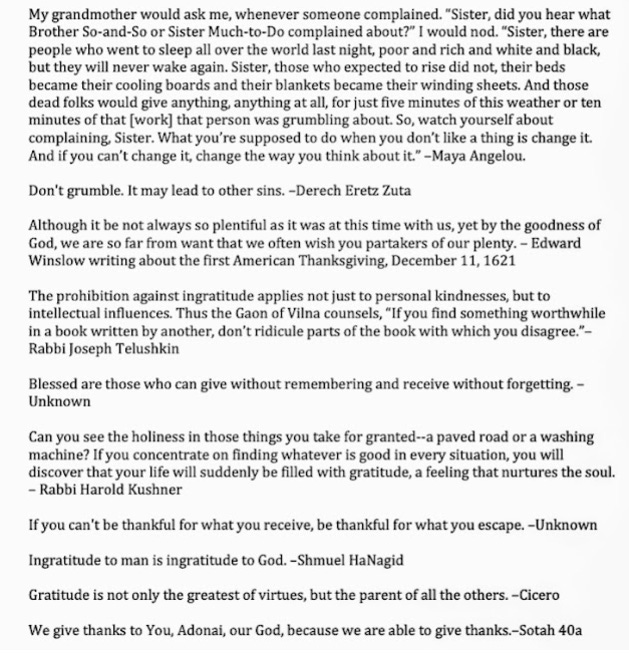
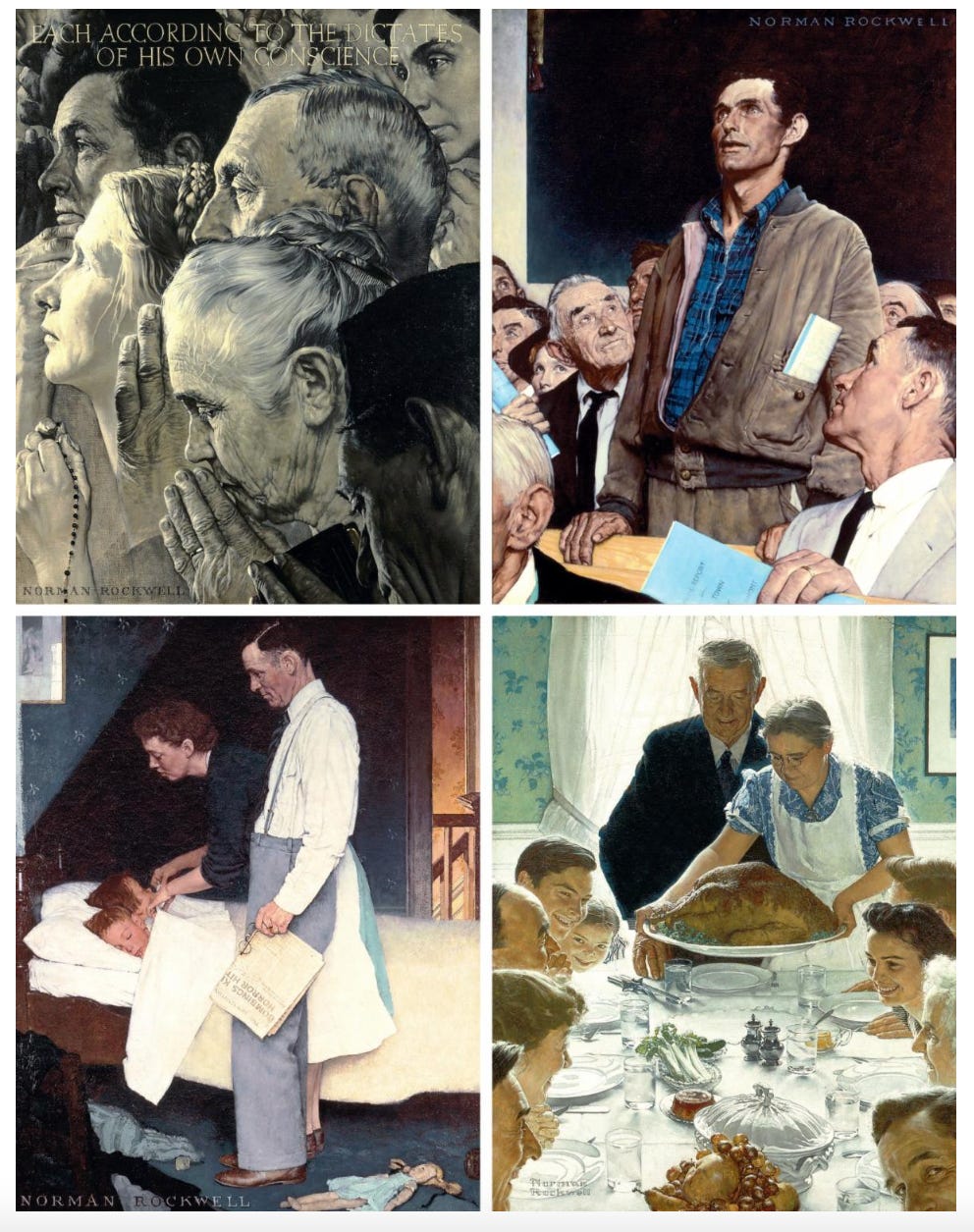
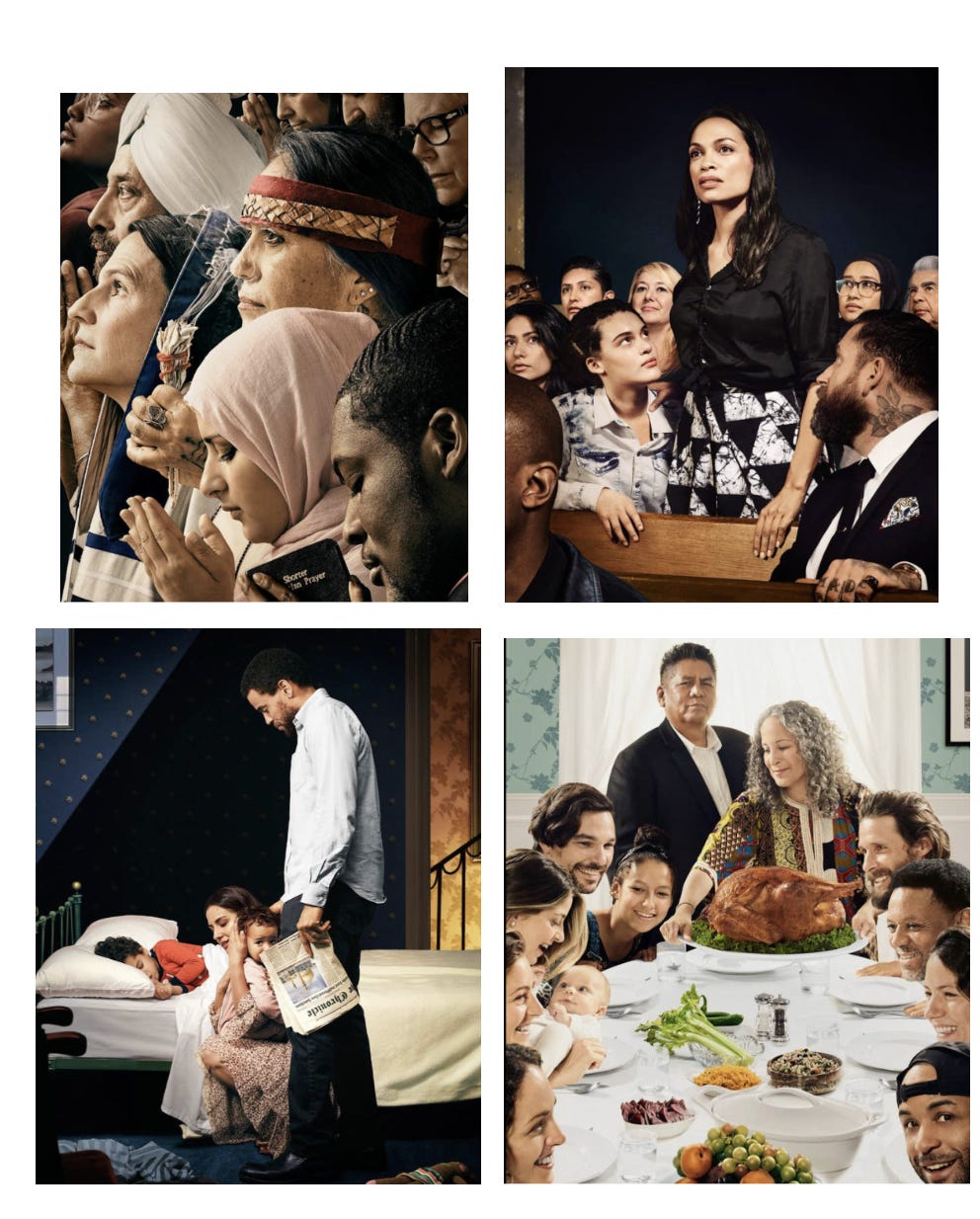
No comments:
Post a Comment